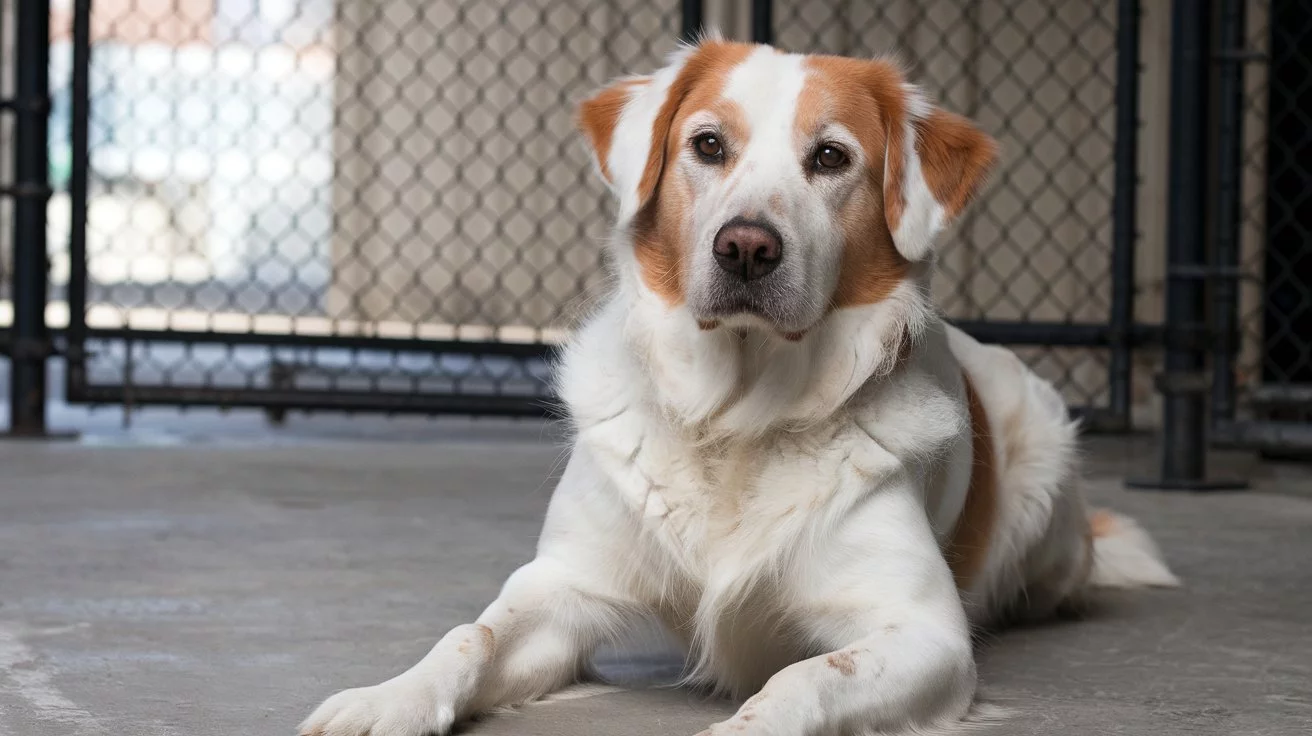In a world where animals are often treated as family members, the story of senior dogs being abandoned for being “too old” is particularly tragic. Abandonment of senior pets is a growing issue, leading to overcrowded shelters and heartbreaking outcomes for these loyal animals. Sadly, many people view older dogs as a burden, despite the years of companionship they’ve provided.
This article will delve deep into the harsh reality of senior dog abandonment, exploring the reasons behind it, the emotional toll on these dogs, and the positive steps we can take to change this narrative. We’ll also look at why adopting a senior dog can be one of the most rewarding experiences and how shelters are advocating for their care.
The Story of the Abandoned Senior Dog

One such heartbreaking story involves a 10-year-old Labrador mix named Buddy, who was left at a shelter after living his entire life with one family. Buddy’s owners said they simply couldn’t care for him anymore because of his age-related health issues. The family moved on, leaving Buddy confused, scared, and abandoned in a shelter full of unfamiliar faces.
Buddy’s story isn’t uncommon. Shelters across the country are seeing a rise in cases like his, where older dogs are being surrendered due to age or associated health costs. These dogs, who have spent years providing loyalty and love, are suddenly discarded at a stage in life when they need comfort and care the most.
In Buddy’s case, he spent weeks in the shelter, too stressed to interact with potential adopters. His once joyful spirit had dimmed, as he struggled to understand why his family left him. This emotional trauma is a reality for many senior dogs, and it highlights the importance of rethinking how we care for pets as they age.
Why Are Senior Dogs Often Abandoned?
There are a few common reasons why senior dogs are left at shelters:
- Medical Costs: As dogs age, they often develop health issues such as arthritis, diabetes, or cancer, which can lead to increased veterinary bills. Many owners feel overwhelmed by these costs and opt to surrender their pets.
- Lifestyle Changes: Owners sometimes experience changes in their lives—such as moving to a smaller home, having children, or taking on new jobs—that make them believe they no longer have the time or space for an aging dog.
- Misconceptions about Age: A common misconception is that senior dogs are less playful or engaging than younger dogs, leading people to prefer puppies or younger pets when considering adoption.
Table: Common Reasons for Senior Dog Abandonment
| Reason | Description |
| Medical Costs | High veterinary bills from age-related health problems like arthritis. |
| Lifestyle Changes | Moving, job changes, or family expansions that result in surrendering dogs. |
| Misconceptions about Age | Belief that senior dogs are less playful or too burdensome. |
This abandonment leaves senior dogs in an especially vulnerable position, as they often face emotional stress and physical challenges when placed in shelter environments.
The Emotional Impact on Senior Dogs in Shelters

For many senior dogs, being surrendered is more than just a change in environment—it’s an emotional trauma. Dogs thrive on stability, routine, and companionship. When a senior dog is suddenly removed from its home and placed in a shelter, it often experiences a sense of loss and confusion.
Shelter staff often witness heartbreaking behavioral changes. Some dogs become depressed or withdrawn, while others may develop separation anxiety. These senior dogs, who have spent years in a familiar environment, now face the overwhelming stress of adjusting to a new, often noisy, shelter atmosphere. Their trust in humans is shattered, and it can take weeks or months for them to recover emotionally.
Case Study: Senior Dogs and Emotional Trauma
In a study conducted by a national animal shelter in the U.S., it was found that senior dogs experience heightened levels of stress in shelters compared to younger dogs. According to shelter workers, 65% of senior dogs show signs of depression within the first two weeks of being surrendered, while 45% exhibit anxiety-related behaviors, such as excessive barking or self-isolation.
Quotes from Shelter Staff:
- “It breaks my heart when I see a senior dog just give up. They don’t understand why they’re here.” —Shelter Worker, Pennsylvania
- “Senior dogs are the most loyal pets, but they struggle the most in shelters. Their stress levels are through the roof.” —Animal Care Specialist, California
He Stole Everyone’s Hearts
Despite the challenges, senior dogs have a remarkable ability to touch the hearts of shelter staff, volunteers, and even adopters. There is something incredibly moving about a dog that has been through so much, yet still has love to give.
Take the story of Max, a 12-year-old Beagle who was abandoned at a shelter because his owners felt they couldn’t manage his health needs. Max was initially timid, avoiding interaction with staff. However, over time, he started to come out of his shell, wagging his tail when he saw familiar faces.
Shelter staff were so charmed by Max that they began featuring him in their social media campaigns, highlighting the importance of senior dog adoption. Max eventually found a new home with a loving family who saw beyond his age and embraced his calm, gentle demeanor.
The Heartbreaking Statistics: Senior Dogs in Shelters
The statistics surrounding senior dog abandonment are staggering.
Key Data on Senior Dog Abandonment:
| Statistic | Figure |
| Percentage of dogs in shelters aged 7+ | 25% |
| Average time senior dogs spend in shelters | 4x longer than younger dogs |
| Senior dog adoption rate | 25% compared to 60% for puppies |
| Euthanasia rate for senior dogs | 50% of all shelter euthanasia cases involve senior dogs |
- 25% of dogs in shelters are senior dogs (7 years or older), yet their chances of adoption are significantly lower.
- On average, senior dogs stay in shelters four times longer than younger dogs, often because adopters are hesitant to take on the potential health issues associated with older pets.
- Euthanasia rates for senior dogs are alarmingly high, with about 50% of all dogs euthanized in shelters being seniors. This is largely due to their longer shelter stays and the mistaken belief that no one wants to adopt them.
These statistics highlight the urgent need for increased awareness and advocacy for senior dog adoption.
Why Adopting a Senior Dog Can Be a Rewarding Experience
Adopting a senior dog can be one of the most fulfilling experiences for a pet owner. Contrary to popular belief, senior dogs offer a host of benefits:
- Loyal Companionship: Senior dogs are often more calm and affectionate, making them perfect for individuals or families seeking a loyal companion.
- Predictable Behavior: Unlike puppies, senior dogs have already developed their personality and are often trained, making them easier to integrate into your home.
- Lower Energy Needs: Senior dogs require less exercise, which makes them ideal for adopters who may not have the time or energy to manage a high-energy puppy.
Testimonial:
“When I adopted Daisy, a 9-year-old Golden Retriever, I was worried about her age. But she’s the sweetest, most loyal dog I’ve ever had. Adopting a senior dog was the best decision I ever made.” —Lucy, Senior Dog Adopter
Table: Benefits of Adopting a Senior Dog
| Benefit | Description |
| Loyalty and Affection | Older dogs tend to bond deeply with their adopters. |
| Predictable Behavior | Senior dogs are usually past the puppy training stage, making them easier to handle. |
| Low Energy Requirements | They need less physical activity, perfect for adopters with busy schedules or low mobility. |
How Shelters Are Advocating for Senior Dogs
Thankfully, many shelters and rescue organizations are working hard to promote the adoption of senior dogs. These initiatives aim to remove the barriers to senior dog adoption by offering special programs and incentives.
Senior Dog Adoption Programs:
- Reduced Adoption Fees: Many shelters offer significantly lower adoption fees for senior dogs to encourage potential adopters.
- Senior-to-Senior Programs: Some shelters match senior dogs with senior citizens, believing that the companionship of an older dog can greatly benefit elderly individuals.
- Medical Support Programs: Certain organizations partner with veterinary clinics to provide ongoing medical care for senior dogs at reduced costs or even for free, helping alleviate the financial burden for adopters.
Shelters also rely heavily on foster programs, where senior dogs are placed in temporary homes until a permanent adopter is found. This not only helps the dog avoid the stress of a shelter environment but also allows potential adopters to see how the dog behaves in a home setting.
What You Can Do to Help
You don’t have to be an adopter to make a difference in the lives of senior dogs. There are numerous ways you can help:
- Adopt a Senior Dog: If you’re considering adopting a pet, don’t overlook the older dogs in need of homes.
- Volunteer at Shelters: Many shelters are overwhelmed, and your time and compassion can make a world of difference. Spend time walking, playing with, or comforting senior dogs to help them adjust.
- Donate: Financial donations, especially those earmarked for medical care, can help shelters cover the cost of caring for senior dogs.
- Raise Awareness: Use your social media platforms to share stories about senior dogs available for adoption. The more people know about the joys of adopting an older dog, the more likely these dogs are to find homes.
Conclusion
The abandonment of senior dogs is a sad and avoidable problem. While the reasons for surrendering an older pet can vary, the emotional and physical toll on these dogs is profound. Adopting a senior dog is not only a compassionate choice, but it also provides adopters with a loyal, loving companion in return. By raising awareness and supporting shelter initiatives, we can give these dogs the second chance they deserve and help them spend their golden years in the loving homes they’ve earned.












